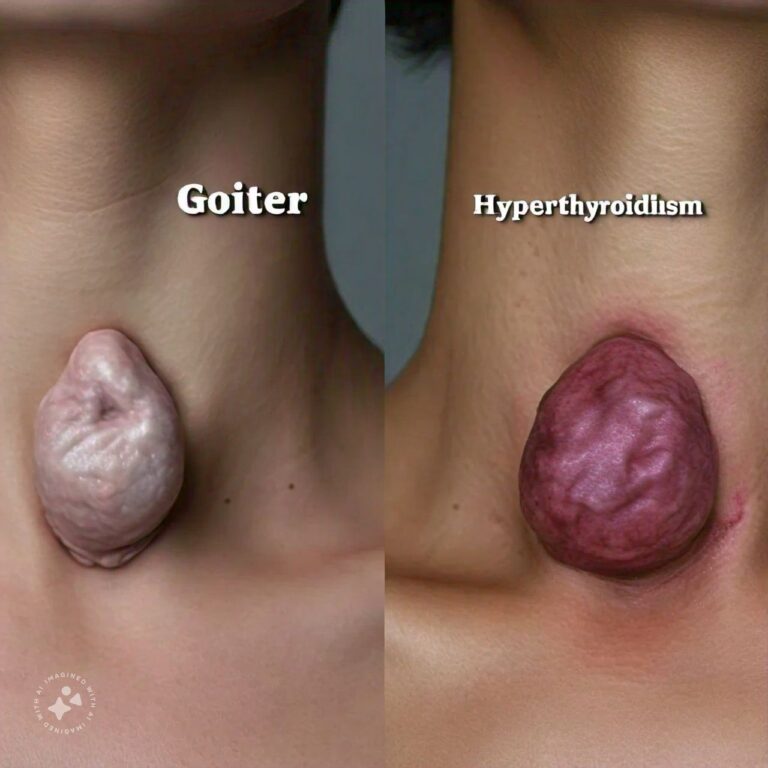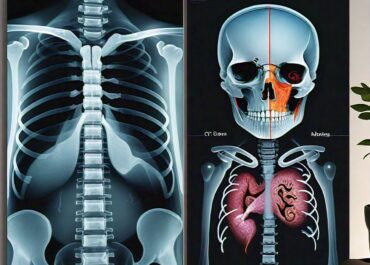
Differences Between Goiter and Hyperthyroidism
Goiter and hyperthyroidism are two medical conditions related to the thyroid gland, but they manifest in different ways and have different implications for a person’s health. The thyroid is a butterfly-shaped gland located at the front of the neck, and it plays a crucial role in regulating the body’s metabolism, energy production, and hormone levels. Goiter refers to an abnormal enlargement of the thyroid gland, which can occur for a variety of reasons, including iodine deficiency, autoimmune diseases, or thyroid nodules. A person with a goiter may or may not have normal thyroid function; goiters can be associated with both underactive (hypothyroidism) and overactive (hyperthyroidism) thyroids. Goiters can cause noticeable swelling in the neck, difficulty breathing or swallowing, and in some cases, changes in voice.
On the other hand, hyperthyroidism occurs when the thyroid gland produces an excess of thyroid hormones, leading to an overactive metabolism. Hyperthyroidism is often caused by autoimmune disorders such as Graves’ disease, where the body’s immune system attacks the thyroid, stimulating it to produce too much hormone. Other causes can include thyroid nodules that produce excess hormones or inflammation of the thyroid. People with hyperthyroidism often experience symptoms like rapid heartbeat, unintentional weight loss, excessive sweating, and nervousness. While hyperthyroidism can sometimes cause a goiter, not all cases of goiter are related to hyperthyroidism. Both conditions are treatable, but they require different approaches depending on the underlying cause.
Goiter Overview
Goiter is a condition where the thyroid gland enlarges, sometimes leading to visible swelling in the neck. Below are five key aspects of goiter.
1. What is Goiter?
A goiter is an abnormal enlargement of the thyroid gland, which can occur due to various reasons, including iodine deficiency, autoimmune diseases, or the presence of thyroid nodules. Goiters can range from small, barely noticeable enlargements to large masses that can interfere with breathing and swallowing. Goiters may develop in people with normal thyroid function (euthyroid), overactive thyroid (hyperthyroidism), or underactive thyroid (hypothyroidism). The thyroid may enlarge in an attempt to produce more hormones in cases of deficiency or as a result of excess stimulation in hyperthyroidism.
- Enlarged Thyroid Gland: Goiter refers to the swelling of the thyroid gland.
- May Occur in Normal, Underactive, or Overactive Thyroid: Can develop in individuals with various thyroid conditions.
2. Causes of Goiter
There are several potential causes of goiter, including:
- Iodine deficiency: The most common cause of goiter worldwide is a lack of iodine, an essential nutrient for thyroid hormone production. In areas where iodine is scarce in the diet, the thyroid enlarges in an attempt to absorb more iodine.
- Autoimmune diseases: Conditions like Graves’ disease and Hashimoto's thyroiditis can cause the thyroid to enlarge. In Graves’ disease, the thyroid is overstimulated, while in Hashimoto's thyroiditis, the immune system attacks the thyroid, causing it to swell.
- Thyroid nodules: Small lumps or nodules within the thyroid can cause the gland to enlarge.
- Thyroid cancer: In rare cases, thyroid cancer can lead to the formation of a goiter.
- Hormonal imbalances: An imbalance in thyroid-stimulating hormone (TSH) can cause the thyroid to grow larger.
- Iodine Deficiency: The thyroid enlarges in response to low iodine levels.
- Autoimmune Conditions: Diseases like Graves’ disease and Hashimoto's thyroiditis contribute to goiter formation.
3. Symptoms of Goiter
The symptoms of a goiter depend on the size of the enlargement and whether it affects thyroid function. Common symptoms include:
- Visible swelling: A goiter often causes visible swelling at the base of the neck, which may become more noticeable when swallowing.
- Difficulty swallowing or breathing: In larger goiters, the enlarged thyroid can press against the windpipe or esophagus, causing discomfort when swallowing or breathing.
- Tightness in the neck: People with goiters often report feeling tightness or discomfort in their neck.
- Hoarseness: Large goiters can press on the vocal cords, leading to a hoarse voice.
- Hyperthyroid or hypothyroid symptoms: Depending on thyroid function, goiters can be associated with symptoms of either hyperthyroidism (such as rapid heartbeat) or hypothyroidism (such as fatigue).
- Swelling in the Neck: Goiters can cause noticeable swelling in the neck.
- Difficulty Swallowing: Large goiters may press on the esophagus or windpipe, leading to swallowing or breathing issues.
4. Diagnosis of Goiter
Diagnosing goiter typically involves a physical examination, followed by diagnostic tests to assess the size and function of the thyroid. These tests include:
- Thyroid function tests: Blood tests to measure levels of thyroid hormones (T3, T4) and thyroid-stimulating hormone (TSH) are used to evaluate thyroid function.
- Ultrasound: An ultrasound of the thyroid helps to determine the size of the goiter and whether any nodules are present.
- Thyroid scan: A radioactive iodine uptake test may be performed to assess how well the thyroid is functioning.
- Biopsy: In cases where thyroid cancer is suspected, a fine-needle biopsy may be conducted to examine thyroid tissue.
- Thyroid Function Tests: Blood tests are used to assess hormone levels and thyroid activity.
- Ultrasound and Scans: Imaging tests help determine the size and structure of the goiter.
5. Treatment for Goiter
The treatment of goiter depends on the underlying cause, size, and symptoms:
- Observation: Small, asymptomatic goiters may not require immediate treatment, but regular monitoring is necessary to track any changes.
- Iodine supplementation: In cases of iodine deficiency, increasing iodine intake through diet or supplements can shrink the goiter.
- Medications: If the goiter is due to hypothyroidism or hyperthyroidism, medications to normalize thyroid hormone levels may help reduce the size of the goiter.
- Surgery: In cases of large goiters that cause breathing or swallowing difficulties, or if thyroid cancer is suspected, surgical removal of part or all of the thyroid may be necessary.
- Radioactive iodine: For overactive thyroid glands, radioactive iodine treatment may shrink the thyroid and reduce goiter size.
- Iodine Supplementation: Used to treat goiters caused by iodine deficiency.
- Surgery: Removal of the thyroid may be necessary for large goiters or suspected cancer.
Hyperthyroidism Overview
Hyperthyroidism is a condition where the thyroid gland produces too much thyroid hormone, leading to an overactive metabolism. Below are five key aspects of hyperthyroidism.
1. What is Hyperthyroidism?
Hyperthyroidism occurs when the thyroid gland becomes overactive and produces excessive amounts of thyroid hormones (T3 and T4). These hormones regulate the body's metabolism, and when their levels are too high, the body’s metabolic processes speed up. As a result, people with hyperthyroidism often experience a range of symptoms related to increased energy expenditure, such as weight loss, rapid heart rate, and excessive sweating. Hyperthyroidism can occur for several reasons, including autoimmune diseases, thyroid nodules, or inflammation of the thyroid.
- Overactive Thyroid: Hyperthyroidism occurs when the thyroid produces too much hormone, speeding up metabolism.
- Increased Metabolic Activity: Leads to symptoms like weight loss and rapid heartbeat.
2. Causes of Hyperthyroidism
Hyperthyroidism can be caused by several factors:
- Graves’ disease: An autoimmune disorder and the most common cause of hyperthyroidism, Graves’ disease occurs when the immune system stimulates the thyroid to produce excessive hormone.
- Thyroid nodules: Noncancerous growths on the thyroid can produce excess hormones.
- Thyroiditis: Inflammation of the thyroid, often caused by an infection or an autoimmune response, can temporarily lead to hyperthyroidism.
- Excessive iodine intake: Overconsumption of iodine, through diet or supplements, can overstimulate the thyroid.
- Medications: Some medications, like those containing iodine or used to treat heart disease, can trigger hyperthyroidism.
- Graves’ Disease: The most common cause of hyperthyroidism, where the immune system overstimulates the thyroid.
- Thyroid Nodules: Benign growths that can lead to the overproduction of thyroid hormone.
3. Symptoms of Hyperthyroidism
The symptoms of hyperthyroidism are related to an overactive metabolism and include:
- Weight loss: Despite an increased appetite, people with hyperthyroidism often lose weight due to a faster metabolism.
- Rapid heartbeat: Tachycardia (rapid heart rate) is common, and some people may experience palpitations or irregular heartbeats.
- Increased sweating: People with hyperthyroidism often experience excessive sweating and heat intolerance.
- Nervousness or anxiety: Hyperthyroidism can cause feelings of restlessness, nervousness, or irritability.
- Tremors: Shaking hands or fingers is a common symptom of hyperthyroidism.
- Weight Loss: Rapid metabolism leads to unintentional weight loss, even with increased food intake.
- Tachycardia and Anxiety: Hyperthyroidism often causes rapid heartbeat and feelings of anxiety.
4. Diagnosis of Hyperthyroidism
Diagnosing hyperthyroidism involves:
- Blood tests: Thyroid function tests measure the levels of thyroid hormones (T3, T4) and thyroid-stimulating hormone (TSH) in the blood. Low TSH and high T3/T4 levels confirm hyperthyroidism.
- Radioactive iodine uptake test: This test measures how much iodine the thyroid absorbs, helping to determine the cause of hyperthyroidism.
- Thyroid scan: A thyroid scan helps identify nodules or other abnormalities in the thyroid.
- Thyroid Function Tests: Blood tests measure TSH, T3, and T4 levels to diagnose hyperthyroidism.
- Radioactive Iodine Uptake Test: Helps identify the underlying cause of excess thyroid hormone production.
5. Treatment for Hyperthyroidism
Treating hyperthyroidism focuses on reducing thyroid hormone production:
- Antithyroid medications: Drugs like methimazole or propylthiouracil (PTU) reduce the production of thyroid hormones.
- Radioactive iodine: Radioactive iodine therapy destroys overactive thyroid cells, reducing hormone production.
- Beta-blockers: These medications do not treat hyperthyroidism directly but help control symptoms like rapid heart rate and anxiety.
- Surgery: In cases where other treatments are ineffective, surgery to remove part or all of the thyroid gland may be necessary.
- Lifestyle modifications: A healthy diet and avoiding excess iodine intake can help manage hyperthyroidism.
- Antithyroid Medications: Used to reduce the production of thyroid hormones.
- Radioactive Iodine Therapy: A common treatment to destroy overactive thyroid cells.
Differences Between Goiter and Hyperthyroidism
- Definition
- Goiter: An enlargement of the thyroid gland.
- Hyperthyroidism: A condition where the thyroid produces excess hormones.
- Thyroid Function
- Goiter: Can occur with normal, underactive, or overactive thyroid function.
- Hyperthyroidism: Always involves an overactive thyroid.
- Appearance
- Goiter: Causes visible swelling in the neck.
- Hyperthyroidism: Does not always cause a visible goiter.
- Symptoms
- Goiter: Symptoms related to neck swelling, such as difficulty swallowing.
- Hyperthyroidism: Symptoms include weight loss, rapid heartbeat, and anxiety.
- Causes
- Goiter: Caused by iodine deficiency, thyroid nodules, or autoimmune diseases.
- Hyperthyroidism: Commonly caused by Graves’ disease or thyroid nodules.
- Thyroid Hormones
- Goiter: Thyroid hormone levels can be normal, low, or high.
- Hyperthyroidism: Always involves high levels of thyroid hormones (T3, T4).
- Diagnostic Tests
- Goiter: Diagnosis often involves ultrasound and thyroid function tests.
- Hyperthyroidism: Diagnosed primarily through blood tests measuring TSH, T3, and T4.
- Treatment
- Goiter: May require iodine supplements, medications, or surgery.
- Hyperthyroidism: Treated with antithyroid drugs, radioactive iodine, or surgery.
- Prevalence
- Goiter: More common in areas with iodine deficiency.
- Hyperthyroidism: Often occurs due to autoimmune disorders, like Graves' disease.
- Complications
- Goiter: Can lead to difficulty breathing or swallowing if large.
- Hyperthyroidism: Can lead to heart problems and osteoporosis if untreated.
Conclusion
Goiter and hyperthyroidism are two distinct yet related conditions involving the thyroid gland. A goiter is simply an enlargement of the thyroid, which can occur with normal, underactive, or overactive thyroid function. It can result from iodine deficiency, autoimmune diseases, or thyroid nodules. On the other hand, hyperthyroidism occurs when the thyroid gland produces excessive hormones, leading to symptoms like rapid heart rate, weight loss, and anxiety. While a goiter can develop in hyperthyroidism, not all goiters indicate hyperthyroidism. Diagnosing and treating these conditions involves careful monitoring of thyroid function and using treatments such as medications, iodine supplements, or surgery. With proper care and treatment, both goiter and hyperthyroidism can be managed effectively, improving patients’ quality of life.
FAQs
Related Topics
- All
- Animals
- Diseases
- Health
- Money
- Politics
© 2024 OnYelp.com. All rights reserved. Terms and Conditions | Contact Us | About us





